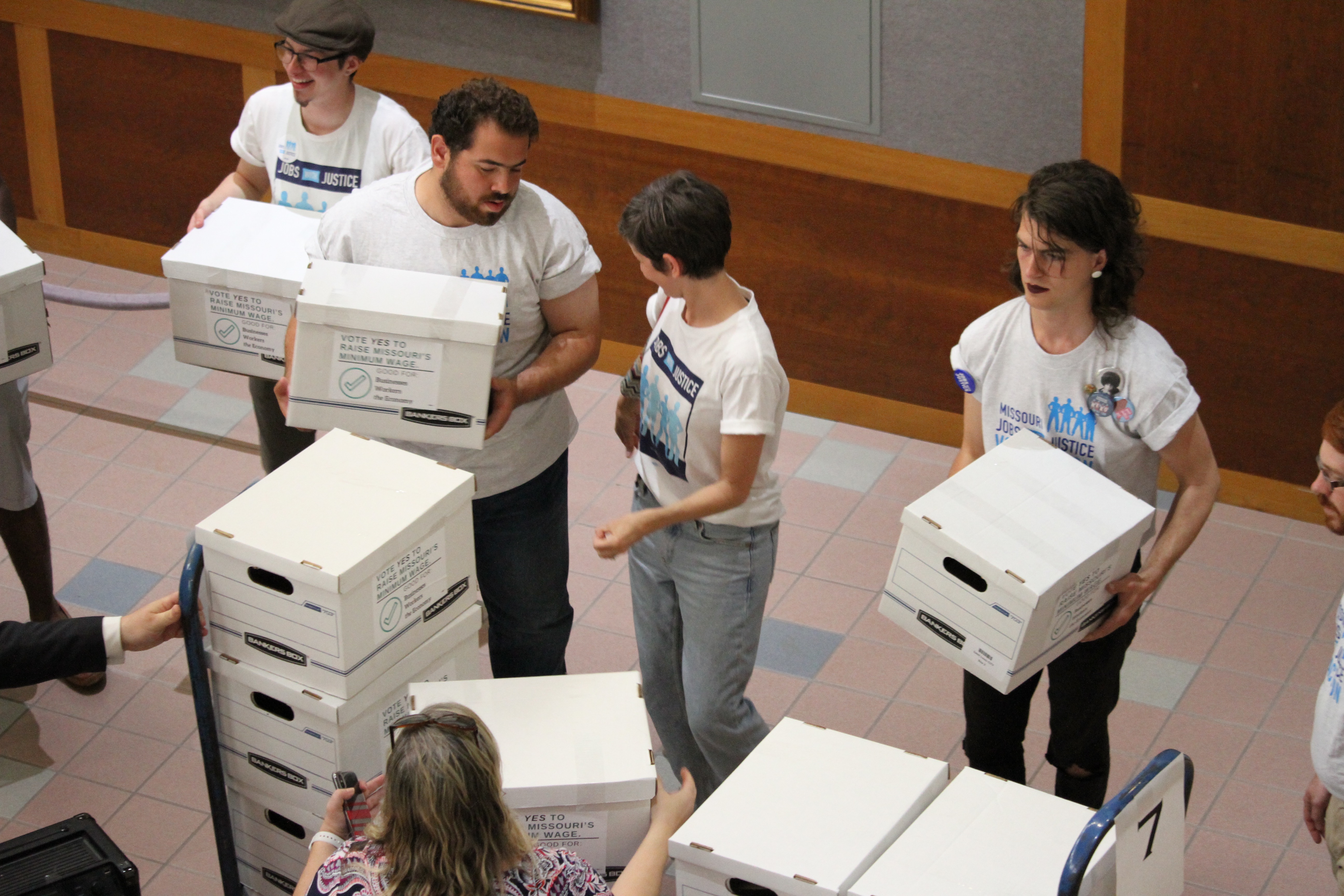Raise Up Missouri submits 120K signatures for initiative to be on November ballot
JEFFERSON CITY, Mo. — Missouri business owners and workers gathered in the state Capital to turn in signatures in an effort to put raising the minimum wage to a vote of the people.
Raise Up Missouri submitted more than 120,000 signatures to the Secretary of State’s Office on May 2 and was joined by Missouri Business for a Fair Minimum Wage, a group of over 200 business owners supporting the initiative.
The initiative would increase Missouri’s minimum wage from its current rate of $7.85 an hour to $8.60 in 2019 and then increase by 85 cents a year until it reaches $12 an hour in 2023.
“I don’t have to tell you the cost of everything to take care of your family has gone up over the years,” said Lew Prince, treasurer of Raise Up Missouri. “We are pushing to raise the minimum wage because across our state there are hundreds of thousands of hard-working people who are being forced to make very hard choices.
“Right now, Missouri parents who make minimum wage are struggling to put food on the table.”
Missouri’s minimum wage is currently $7.85 an hour, which translates for a person working fulltime to $314 a week before taxes and $16,328 a year — provided they work 52 weeks — before taxes.
“That means thousands of Missourian who put in an honest days work, barely get by,” Prince said. “We believe no one who works fulltime should have to live in poverty.”
Barbara Lomker works as a cashier at O’Fallon North Shop-n-Save and says she and her husband live paycheck-to-paycheck.
A person shouldn’t have to choose between sitting at home and eating or driving their car and starving, Lombker said. No one who works full-time should have to choose between food and medicine, according to Prince.
“We are frugal. We work hard and like to work. It’s what we are supposed to do. It just shouldn’t be this hard.”
Raise Up Missouri does expect some pushback on the ballot initiative but says opponents will have to burden to prove their claims. In other states and cities that have opted to raise the minimum wage, there has been campaign kickback that doing so would increase the price of goods, services and result in cut hours and layoffs.
“The idea that paying a higher minimum wage hurts business growth is a complete fallacy,” said Scott Sandler, owner of Pizza Head in St. Louis. “[It] is based on the false assumption that productivity stays the same.”
He said the paying the current minimum wage is telling workers you don’t value them. Using his own business as an example, he says paying his workers as living is good for business. A fair wage lowers employee turnover — which saves time and money — and results in better customer service and higher productivity.
Raising the minimum wage is “good for workers, businesses, and the local economy,” according to Pam Hausner, owner of Big Visions Design in Kansas City.
According to an analysis by the Economic Policy Institute, the proposal would result in an increase of more than $1 billion in consumer buying power in Missouri.
“Business owners need customers with money in their pockets, spendable money,” said Prince.
Prince cites a 2011 study by the Chicago Federal Reserve Bank that found raising the minimum wage increases consumer spending. The authors concluded that every dollar increase in the minimum wage results in $2,800 in new spending by the household over the following year.
Also cited was a study titled “Local Minimum Wage Laws: Impacts on Workers, Families and Businesses” that was prepared for the Seattle Income Inequality Advisory Committee in 2014 — The minimum wage was $9.32 an hour in Washington state at the time before the city gradually increased to $15 an hour. The study found minimum wage hikes have minimum effects on price. On average, a 10 percent minimum wage increase results in less than 1 percent increase in restaurant prices and non-detectable in other low-wage industries.
“Raising the minimum wage is not about charity,” said Sandler. “It is about building strong and a strong economy where working people earning enough to support themselves and buy the products and services our businesses are selling.”

Alisha Shurr was a reporter for The Missouri Times and The Missouri Times Magazine. She joined The Missouri Times in January 2018 after working as a copy editor for her hometown newspaper in Southern Oregon. Alisha is a graduate of Kansas State University.




